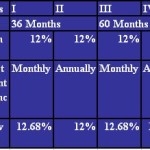Mutual Fund is a pool of money and investor in a scheme is issued units of the scheme. NAV indicates the value of unit allotted to the unit holder.
How NAV is calculated –
NAV factors following parameters –
- Total Scheme Assets
- Liabilities [Excluding towards unit holders].
- No of units allotted.
Factors contribute towards income & expenses of any mutual fund scheme:
Capital Gains – NAV includes MTM – Mark To Market Capital Gain.More is the capital gain it will enrich the NAV.
Capital Loss – Its opposite to capital gain & it will be negative for mutual fund NAV.
Dividends – Equity Dividends received through different stocks will be added in overall assets of the scheme & will enrich NAV.
Interest Income – Interest received through fixed deposits/Bonds will added in the assets of mutual fund scheme.
Income through Exit loads – Income earned through exit load is added back into the scheme.
Scheme Expenses – More are the scheme expenses,lower will be the NAV. General expenses for any mutual fund schemes are:
-Fees towards Registrars & Transfer Agents,Custodians,Auditors.
-Advertising expenses.
– Expenses towards payments of brokerages.
-Expenses towards investor communications.
-Service Tax.
Which Cost is not inclusive in NAVs:
- General Administrative costs -AMCs need to cover general administrative expenses from their own pocket.
- Fines -Suppose if any scheme penalized for violations & fined thereafter then such expenses can not be charged to mutual fund scheme.
- Costs towards borrowed money.
- NFO expenses.
NAV of Direct Schemes – NAV of direct schemes won’t include charges towards brokerage and so NAV of direct plans in comparison to regular plan will be on higher side.
Bottomline –
Mutual fund scheme is like water tank..If inlet streams are more powerful in nature than outlet stream then only higher accumulation is possible.So ideal mutual fund scheme should have combination of lower expense & higher income to result in high nav..isn’t it?.
Also View: Direct Plans from Mutual Funds





